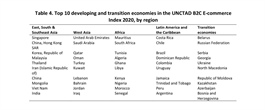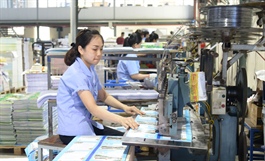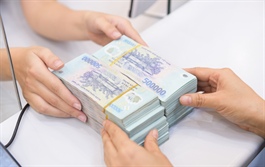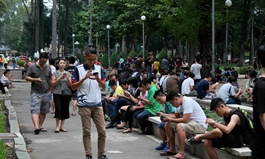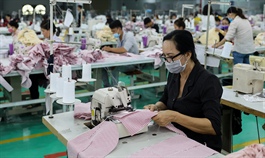Vietnam growth prospects endure despite new Covid-19 outbreak: Fitch Ratings
Vietnam growth prospects endure despite new Covid-19 outbreak: Fitch Ratings
Vietnam’s GDP growth could more than double to 7.5 percent this year despite the latest Covid-19 outbreak, a Fitch Ratings analyst told VnExpress.
Workers are seen at the construction of an expressway connecting the provinces of Quang Tri and Thua Thien Hue, central Vietnam. Photo by VnExpress/Vo Thanh.
|
She identified continued success in containing its spread and attracting foreign direct investment as a key growth spurring factor.
"The fact that the Covid-19 pandemic has been relatively well contained should help domestic demand and that will be a driver of growth going forward," said Sagarika Chandra, a Vietnam lead analyst with credit rating company Fitch Ratings.
Although 791 local Covid-19 cases have been recorded since January 28, Fitch stands by its growth forecast, assessing that Vietnam’s effectiveness in handling the outbreak has resulted in a relatively smaller number of cases.
The 2.9 percent GDP increase last year served as a base for this year’s growth prediction, Chandra said.
Another factor that will contribute to growth is foreign direct investment, which is expected to remain strong and account for 4 percent of GDP this year and next. Vietnam and other Southeast Asian countries are set to continue benefiting from FDI inflows as companies shift manufacturing from China, she added.
A unit of Taiwanese electronics giant Foxconn received a license earlier this year to build a $270 million plant in northern Vietnam to produce laptops and tablets.
This followed several moves by major companies like Panasonic, Samsung and Intel to expand their presence in Vietnam amid trade tensions between the U.S. and China.
Although it is not yet clear how relations between the new U.S. administration and Southeast Asia will evolve, it is likely that the U.S. will adopt a more predictable and multilateral approach, which bodes well for the region, Chandra said.
"The fact that Vietnam has recently been labelled a currency manipulator by the U.S. Treasury complicates its economic relationship with the U.S., but we expect the two sides to engage in discussions in the coming months to try and dial down the tensions."
The Fitch analyst also highlighted several challenges facing Vietnam, including liability risks from state-owned enterprises and structural weaknesses in the banking sector. Vietnam is also vulnerable to shifts in external demand due to its high degree of openness, she said.
She also said greater policy flexibility in currency management and improvement in public finances, reflected in smaller budget deficits or a decline in the general government debt ratio, were factors that can boost Vietnam’s ratings.
Meanwhile, factors that could lead to negative ratings include policy changes that result in macroeconomic instability via depletion of foreign exchange reserves and significant decline in foreign investment, she added.









